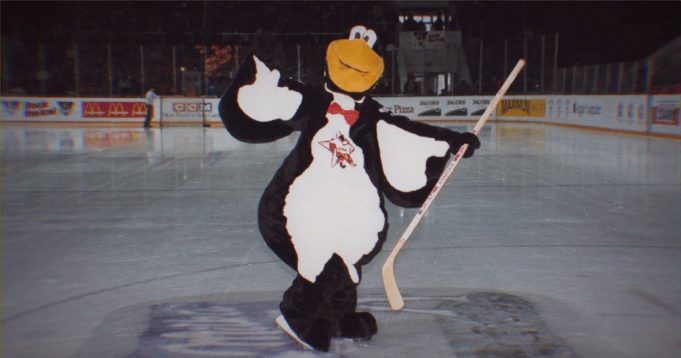My interests in hockey and film don’t often intersect, but with the NHL back on the ice, Universal Studios is putting out Red Penguins, a documentary by Gabe Polsky. I came into it thinking it would be about the great Russians who have played for the Pittsburgh Penguins: Alexei Kovalev, Sergei Zubov, Sergei Gonchar, Evgeni Malkin. Instead, it spins a fascinating story about the Penguins’ attempt to break into the Russian hockey business in the early 1990s, immediately after the breakup of the Soviet Union. Last year’s documentary The Russian Five showed us how successful the Detroit Red Wings were at dealing with the motherland at this time. Their Pittsburgh colleagues had a much less happy experience.
If you saw Polsky’s last hockey documentary, Red Army, you learned how athletic clubs in the Soviet Union (which were single entities encompassing teams in numerous sports like hockey, soccer, basketball, bandy, and others) were controlled by different branches of the Soviet state. Games between them were really proxy battles for power among the KGB and the ministries of agriculture and transportation. CSKA Moscow was the province of the army, and while they enjoyed success in other sports, they were utterly dominant in hockey through the 1970s and ’80s under legendary coach Viktor Tikhonov. Promoted to the rank of colonel by virtue of his achievements on the ice, Tikhonov was used to receiving lavish resources from the army, but the gravy train stopped when the Cold War ended and his top players like Sergei Fedorov and Pavel Bure left for the fat paychecks and stability of the NHL. Fresh off a Stanley Cup win, Penguins owners Howard Baldwin and Tom Ruta stepped in to save this desperate, fallen powerhouse by buying a 50 percent stake in CSKA. Baldwin, a Hollywood producer, told CSKA boss Valeri Gushin, “We’ll make you a capitalist.” At this, he would fail.
Polsky well evokes the madness that engulfed post-Soviet Russia through the travails of CSKA. The Pens’ management found a dilapidated CSKA Arena serving as a strip club as well as a hockey venue, with licensed doctors driving the Zamboni because that job paid more than practicing medicine. Pittsburgh’s point man in Moscow was Steve Warshaw, a tiny, high-energy p.r. guy who saw the thousands of empty seats at games and vowed to fill them by Christmas. He did it with stunts that would put a minor-league baseball team to shame, hiring the strippers as cheerleaders, having circus-trained bears perform between periods, and giving away all manner of free stuff ranging from rolls of toilet paper to a new Jeep, though nothing worked so well as the free beer shipped in from western Pennsylvania.
Polsky packs the 80-minute running time with surreal little details like a TV commercial that the stoic Tikhonov shot for Vicks cough drops (because his name was Viktor) or the fact that Baldwin wasn’t keeping his usual eye on the books at CSKA because he was busy filming the Jean-Claude Van Damme hockey thriller Sudden Death. The Russian-speaking filmmaker also nabs a number of high-profile interviews such as Alexander Baranovsky, who was pulling double duty as CSKA’s president and Russia’s defense minister in the early 1990s, and Alimzhan Tokhtakhunov, the infamous racketeer who bribed the figure skating judges at the 2002 Winter Olympics and now lives in grand style as a fugitive from American justice. I’m a bit disappointed that he didn’t get Michael J. Fox, the actor who was part of Baldwin and Ruta’s consortium despite being a lifelong Toronto Maple Leafs fan.
These hijinks point the way to the highly unamusing business that torpedoed the American-Russian partnership, as Gushin and Tikhonov were so convinced that the Yanks would steal from them that they stole millions from the team themselves. The mafia’s determination to take their cut of the profits led them to assassinate the head of concessions in the parking lot outside the arena. (Later, they would do the same to a CSKA assistant coach.) Disney mogul Michael Eisner, who had just founded his own NHL franchise in Anaheim, wanted to invest $50 million in the Russian Penguins, but the chaos scared him off. With all this, it’s no wonder that the Russian people wound up embracing a dictator like Vladimir Putin, who promised and delivered law and order at a price that they were willing to pay.
All Pittsburgh really wanted was a Russian superstar or two to bolster their title-winning team. The one they got was Zubov, the slick defenseman whom they gave up on too soon, and who went on to win the Stanley Cup with the New York Rangers and here with the Dallas Stars. By their own admission, the Penguins didn’t know what they were in for when they went to Russia. The perils of doing business in a foreign, kleptocratic culture checked them hard into the boards.
Written and directed by Gabe Polsky. Rated PG-13.












